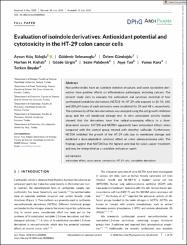Evaluation of isoindole derivatives: Antioxidant potential and cytotoxicity in the HT-29 colon cancer cells

Göster/
Erişim
info:eu-repo/semantics/openAccessTarih
2020Yazar
Kılıç Süloğlu, AysunSelmanoğlu, Güldeniz
Gündoğdu, Özlem
Kishalı, Nurhan H.
Girgin, Gözde
Palabıyık, Sezin
Tan, Ayşe
Kara, Yunus
Baydar, Terken
Üst veri
Tüm öğe kaydını gösterKünye
Kılıç Süloğlu, A., Selmanoglu, G., Gündoğdu, Ö., Kishalı, N. H., Girgin, G., Palabıyık, S., ... & Baydar, T. (2020). Evaluation of isoindole derivatives: Antioxidant potential and cytotoxicity in the HT‐29 colon cancer cells. Archiv der Pharmazie, 353(11), 2000065.Özet
Norcantharimides have an isoindole skeleton structure, and some isoindoline derivatives have positive effects on inflammatory pathologies, including cancers. The present study aims to evaluate the antioxidant and cytotoxic potential of four synthesized isoindoline derivatives (NCTD1–4). HT-29 cells exposed to 10, 50, 100, and 200 µM doses of each derivative were incubated for 24 and 48 h, respectively. The cytotoxicity of the new derivatives was analyzed using the cell growth inhibition assay and the cell membrane damage test. In vitro antioxidant activity studies showed that the derivatives have free radical-scavenging effects in a dose-dependent manner. NCTD3 and NCTD4 apparently have antioxidant effects when compared with the control group treated with dimethyl sulfoxide. Furthermore, NCTD4 inhibited the growth of the HT-29 cells due to membrane damage and exhibited a dose-dependent cytotoxic effect on colon adenocarcinoma cells. The findings suggest that NDTD4 has the highest potential for colon cancer treatment and may be interpreted as a candidate anticancer agent. © 2020 Deutsche Pharmazeutische Gesellschaft

















